
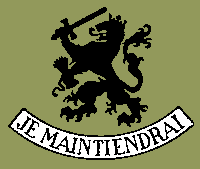
I Was a Slave to Queen Juliana
for 2 years in the Dutch Army!
In April 1961 I was forced to join Her Royal Majesty's armed forces
Koninklijke Landmacht, part of NATO, and loyally served her for 2 years.
It was absolutely the worst time in my life—a barren waste.
Just be thankful that the enemy is certain to have been just as inept.
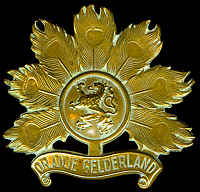
Boy, did you get into trouble if you dared polish your baret emblem like that!
You had to use a toothbrush to get that bile-green stuff out of the nooks and crannies.
For the first two months, I earned 50 Dutch cents a day of soldij; at that time less than US$0.14. They then sent me to the Kaderschool Infanterie where I was trained for a sergeant. For 5 months I was paid as a trained soldier there, less than US$0.21 a day. Finally I got my stripes and real good payment! almost US$.42 per day. In 1940 a Dutch conscripted soldier got that, 1.50 guilders, a week (J.B. Charles). Compare with the 4.50 "war guilders" the Japanese paid daily to Indonesian workers in 1942 for compulsory labor (Escape or Die by Paul Brickhill). The USA and Canada then paid their soldiers $1/day to lay their lives on the line, according to John Kenneth Galbraith.
After half a year of serving for this Royal Salary, you were supposed to be promoted from sergeant titulair to sergeant effectief. Surely you can guess the meaning of those titles. This entitled you to a salary of, if my memory doesn't fool me as is its wont, US$41,67 per month. However, as there was a power struggle going on in the higher echelons, it was decided to punish the officers of our 299 Light Airplanes Squadron by delaying this promotion for all sergeants for two months. Does this figure? In the army, it does.At the same time, during maneuvers we were forced to use up much more ammunition than "needed". This because, if all ammunition was not used up, they would get a smaller supply next year; unacceptable!The normal time to serve as an enlisted man at the time was 18 months. But as there was some slight trouble with Indonesia over New Guinea just then, and Holland needed more troops to keep filling the NATO quota, somewhere higher up it was decided to prolong this to 2 full years. Interesting sideline: Troops were transported to New Guinea by KLM - dressed up as civilians to avoid trouble en route, and detoured via Africa for the same reason.
Likewise, in the Schefferkamp of De Lier where I was trapped, two Harley Davidson motorcycles were sitting in a shack, new in crates. These were taken away and replaced by two other new Harley Davidson motorcycles, which never left their packing crates either. They were supposed to be used for courier services in case of war; only, nobody knew how to ride them.
For coffee breaks, the helicopter pilots of our squadron routinely flew their Bells from the parking space to the mess and back. This set the taxpayers back some 500 guilders a cup. Enough already.
When we finally got out, we were all forced to sign a paper that the army released us in good health, so presumably we wouldn't be able to sue for any damages sustained. Everybody signed this of course; the alternative was to remain in the army!
could spend his life in the service.
Sterling Hayden, Wanderer
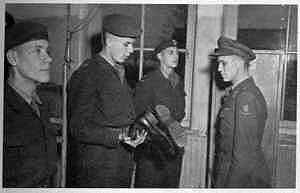
Holding Inspections
Handboek voor de dienstplichtige onderofficier
Departement van Defensie pub. VS2-1351, page VIII-1
Other instances of slavery in history
Jews and other people who had been forced to work in German factories in WWII were, some years ago, awarded compensation. And rightly so.
There are now also movements trying to get a similar compensation for descendants of slaves who were caught in Africa and sent to the Americas. What is weird about this is, they want to sue Holland and Dutch companies for this (and, fairly guessing, other nations and their institutions as well). It is, however, well known that the Africans were for a large part caught by other Africans who sold them to the slave traders. You never hear about plans to sue those "brothers" or their descendants.
This is logical, as there is not much to be got there by way of recompensation. Naturally you try and sue the guy who can pay up. But, from the point of view of pure justice, there is not so much logic here.
Be that as it may, I have decided there is at least just as much reason for me to sue the Government of the Kingdom of the Netherlands to recompense me for my period of slavery. I am now looking for a lawyer who will go to court with me.
No war can be fought without someone's feelings being hurt.
C.S. Forester - Commodore Hornblower
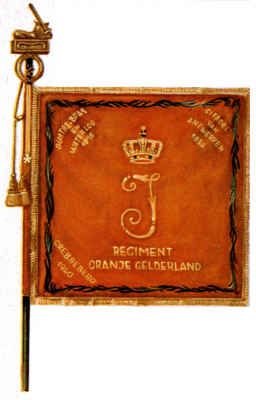
The Standard of my Regiment
Regiment Infanterie "Oranje Gelderland"
Top left "Waterloo", We Were With Wellington!
Arguments
Of course, there are pros and cons here, but the case may not be so clear-cut against me (and many thousands of my fellow-slaves) as it may seem at first sight:
— This was a completely legal procedure and covered by law in a democratic country. So was old-time slavery a completely legal procedure, democratic or not. Also, then, the guys who had to serve in the army had no voting rights; you were called up at 18 years and yourself couldn't vote before you were 21.
— They completely robbed me of my freedom. I could not leave the premises at all for extended periods and was always forced to spend nights there. Except for 1 Saturday night every 2 weeks, I was on call of the army night and day and have been awakened in the middle of the night several times for a so-called NATO General Alarm. The commandant was permitted to give you, as a favor-not a right, 1 free night ("home" before 24:00 hours) a week.
— I was forced always to wear a uniform, also in my free time. If I damaged it, I had to pay for a new one. Same for all my equipment. We had three sets of linen: "One on the man, one on the shelf and one in the wash." Actually, this was not so bad as we only got a chance to shower once a week - not unusual in Holland at the time anyway. We slept with over 40 guys in an at the most 7x10 meters room. For some reason, there were always outbreaks of tetanus epidemics in Dutch barracks.
— I had to eat their filthy food. No choice. Well do I remember one occasion where the cooks had bought a load of cauliflower literally teeming with caterpillars and served it up, probably putting the price difference between that and decent food cheerfully into their pockets.
— Because we had to use guns without any ear protection at all, I have been partly deaf in my right ear (next to the gun) for the rest of my life. The paper we had to sign before being released that we were in good health is a joke. No court of law would accept a "contract" signed under such pressure, were this a business deal. By the way, they now do use ear protection in the Dutch army. Maybe that's why the dialogues in Dutch movies now are, if not intelligent, at least intelligible: the sound engineers are less deaf.
— Contrary to verdicts of the Nürnberg trials ("Befehl ist Befehl"), the Reglement betreffende de Krijgstucht [Rules regarding Military Discipline] literally states (Article 11): "The military man has the obligation to obey punctually the verbal or written military orders, and the military prescriptions that apply to him." Sure, there are other passages in there about how you're not supposed to be given any unlawful orders, and how to protest against them (afterwards). Don't make me laugh, it hurts.
If you really got into trouble, you might get sent to Nieuwersluis, which was more or less like Leavenworth in the USA. Only, you definitely get the impression that much less was needed for a visit to that detention camp; like, refusing to get a haircut.
What I only found out more recently, a stay in Nieuwersluis ruined your chances of getting many jobs in later life; for example, working for the fire brigade.
en de voor hem geldende dienstvoorschriften stipt op te volgen."
(Reglement betreffende de Krijgstucht, 1922-1927-1954
Ministerie van Oorlog publ. 27-3103, p6).
Three sites that give more info on the glorious Dutch army in those days
in Dutch, but mainly photographs
Documenten uit de dienstplichttijd
Dienstplicht
Ongelukken in de Krijgsmacht
If anybody can explain the difference between those conditions and slavery, please do.
But you'll have a hard time convincing me.
All of which serves to explain why I request some sharp lawyer
to contact me by
so we can start legal procedures against the Koninkrijk der Nederlanden.
Let us sue the bastards!
To leave a detonator in a warhead is criminal, that's what it is.
Desmond Bagley - The Spoilers
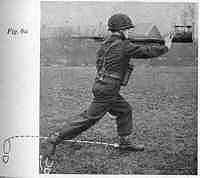
The Dance of Death
Smash his face with your rifle butt - there's a good fellow
Handboek voor de soldaat
Departement van Defensie pub. VS2-1350, p. XV-6
The most anti-militaristic book I ever read - and one of the funniest, too!
The Good Soldier Schweyk
by Jaroslav Hasek



| Search this site powered by FreeFind |

Custom Search
copyright notice
all material on this site, except where noted
copyright © by , curaçao
reproduction in any form for any purpose is prohibited
without prior consent in writing
the photos out of army instruction manuals
© by the Kingdom of the Netherlands